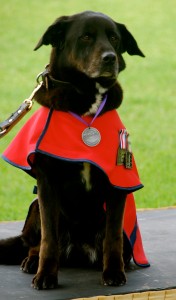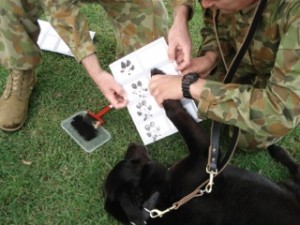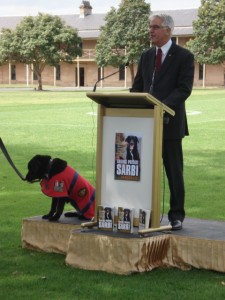
Explosive Detection Dog Sarbi, in her custom-made red jacket to denote the EDD Section, at the launch of the new book, Saving Private Sarbi (picture Laura Robins)
The former top dog of the Australian Army launched my new book, Saving Private Sarbi, The True Story of Australia’s Canine War Hero, this week with a moving speech in which he highlighted the unbreakable bond between the explosive detection dogs and their handlers.
In a distinguished event at Victoria Barracks in Sydney’s Paddington, Lieutenant General Ken Gillespie, AC, DSC, CSM (ret) introduced the four-legged hero, Sarbi, saying the highly-trained EDD and her canine counterparts were unrivalled in their ability to protect soldiers from the lethal roadside bombs and improvised explosive devices, the enemy’s weapon of choice in Afghanistan.
No technology had yet been developed that could do what the EDDs do on a daily basis – putting their four paws on the line every time they went to work sniffing out IEDs, LtGen Gillespie said.
Sarbi, who turned nine years old on September 11, was a divine doggie diva as she sat politely on the podium while the General extolled her virtues in front of 70 invited guests from the media, military and mutt worlds.
She even signed an exclusive series of the book by dipping her front right paw in non-toxic ink (vegetable dye). Six limited edition, numbered copies of Saving Private Sarbi pawed by Sarbi and signed by me will be auctioned for Legacy and the Australian Institute for Deaf and Blind Children in the coming year.
Sarbi’s handler, Sergeant D, was unable to attend the launch as he is on his fourth deployment to Afghanistan. His identity is protected – for operational security reasons. He joined the army in 1995 and became a dog handler in 2000.
Among the guests at the launch were several officers and members of the Australian Army family including the wife of Major General Mick Slater, the officer who recently returned from leading the Queensland floods recovery.
Royal Australian Navy specialist clearance diver, Paul de Gelder, attended, as did one of the original ‘tunnel rats’ from the Vietnam War, Sandy MacGregor.
Well known media identities included Miranda Devine and Piers Akerman from News Limited, Janine Perrett from SkyBusiness, radio and television commentator Melissa Hoyer , gun reporter Kate McClymont from The Sydney Morning Herald, as well as one of the stars of Good News World, Mikey Robins. Fellow authors Caroline Overington (also of The Australian), Sue Williams, Lynne Cossar and Jimmy Thomson were also in attendance.
Some background.
Sarbi and Sgt D have been a team since Sarbi joined the Army in 2005.
Sergeant D was Sarbi’s original trainer and has been her only operational handler.
Sarbi and Sgt D were part of the extensive security team for the 2006 Commonwealth Games in Melbourne, and in 2007 were on their first deployment to Afghanistan, where they distinguished themselves with some serious ‘finds’ of enemy weapons and bombs and bomb-making material.
In 2008, Sarbi and Sergeant D were deployed to Uruzgan a second time.
On September 2, they were on patrol in the remote region of Khas Uruzgan.
Sgt D was with 11 troopers from the elite Australian Special Air Service Regiment, about a dozen battle-hardened men from the United States Special Forces, and a team of soldiers from the Afghan National Army.
The Special Forces patrol had one mission: to remove the Taliban from the region.
In the previous 24 hours, they had done a pretty good job of it. En route to base after a successful operation, they were ambushed by up to 100 Taliban fighters hidden in well-fortified positions.
So began a four-hour, do-or-die battle in which nine of the 12 Aussies were wounded, including Sergeant D. Three had life threatening injuries.
Sergeant D’s American counterpart, a dog handler by the name of Sergeant Gregory Rodriguez, was killed in the ambush. Several Afghan soldiers were also wounded. An Afghan interpreter was blown off the back of a US Humvee with Sergeant D and sustained near fatal wounds.
As Lt General Gillespie pointed out at the launch on Wednesday, SAS Trooper Mark Donaldson, distinguished himself during the battle by running into the line of fire several times to help draw fire away from his mates, and to rescue the wounded Afghan interpreter. For these heroic actions, he was later awarded the prestigious Victoria Cross.
Another soldier was awarded the Medal For Gallantry for his actions.
Like her handler, Sarbi was also wounded in the ambush when a razor sharp piece of shrapnel from a rocket propelled grenade sheered through the carabiner’s clip that fastened her to Sgt D. At the end the firefight, she went missing in action, lost in the Afghanistan countryside for the next 13 months.
A lot of people wonder about the bond between handler and hound in the Army, but as Lt General Gillespie said at the launch, that connection can never be underestimated.
Many in the audience – including me – fought back tears as the General told of meeting Sergeant D in a field hospital at Tarin Kot the day after the ambush. He was at one end of a ward with seven other wounded Diggers, all lying across from each other, toe to toe.
Lt General Gillespie moved through the ward checking on each of the wounded soldiers and finally came to Sergeant D. The General said he was shocked by the soldier’s face.
“It was almost completely pockmarked,” he said.
Sgt D had also been sliced with shrapnel and razor sharp metal fragmentation from rocket propelled grenades. The only parts of his face unmarked were around his eyes where protective glasses had prevented certain blindness. His legs, torso and arms were also wounded.
To get an idea of how bad he looked, it’s worth noting that during interviews for my book, Sgt D told me that as the convoy of five Humvees roared back to their remote Fire Base Anaconda, he tried to stop a fellow Australian with more serious wounds falling unconscious. The Digger kept closing his eyes, and Sgt D feared if he lost consciousness, he might die.
In the hospital the next day, the soldier told Sgt D he was never in danger of slipping into unconsciousness when he closed his eyes.
“He just didn’t want to look at me because my face was so cut up and looked pretty horrible. I didn’t know how bad it was,” Sgt D told me.
That was the face looking up at LtGen Gillespie. The General asked Sgt D what he had done and who he was.
“I’m the dog handler, Sir.”
As Sgt D explained that Sarbi had gone MIA towards the end of the battle, the veteran soldier choked up and couldn’t finish his sentence. The other seven wounded men all turned their heads away, out of respect and because they were, as the General said, equally distraught by the loss of their four-legged warrior.
It was a telling – and extraordinarily moving – part of the General’s speech
The bond between the explosive detection dogs and their handlers is unbreakable, and the dogs also are a shot of morale for the men and women they work with and around in Afghanistan. It’s no wonder the men in the hospital ward with Sergeant D had to turn away as he did his best to explain what happened.
Animals – especially dogs, and more particularly working dogs on whom we humans rely for so many things – have the incredible ability to lift our spirits; they have the power to transform us humans into something better than we are; to teach us compassion and kindness, and the rewards of unbidden loyalty.
In a way, the ability of the explosive detection dogs to foster a sense of camaraderie and kinship with their two-legged compatriots is unrivalled. It’s why the Special Forces soldiers never gave up on Sarbi and kept an eye out for her every time they went out on patrol. It’s why they finally got her back – in one piece, if a little fatter!
Sarbi was a dog, but she was one of them – an Australian Digger. They never get left behind.
Sarbi finally returned to Australia in December last year and is now back at work at the School of Military Engineering in Holsworthy, training new dog handlers.
She will retire when Sgt D returns from his current deployment to Afghanistan and live out the rest of her days as a pampered pooch, with another retired explosives detection dog, Vegas.
You can buy the book online at any number of sites, or by starting at Allen and Unwin’s homepage here. Saving Private Sarbi is also available in eBook format.



